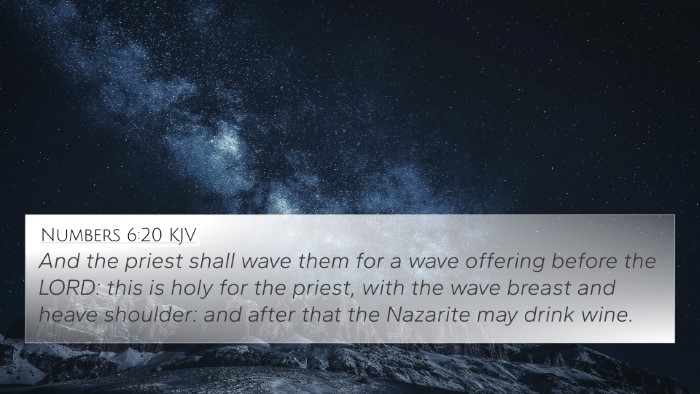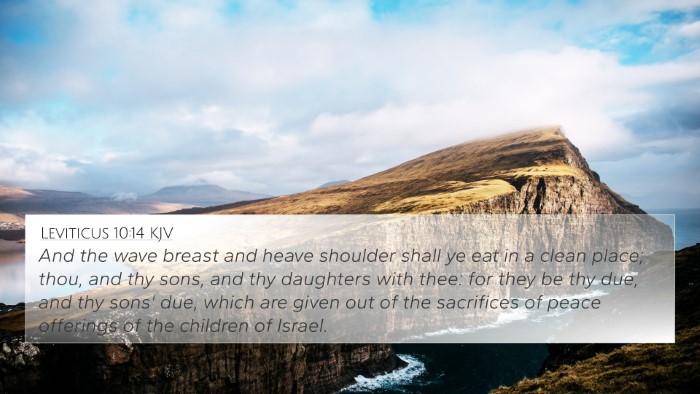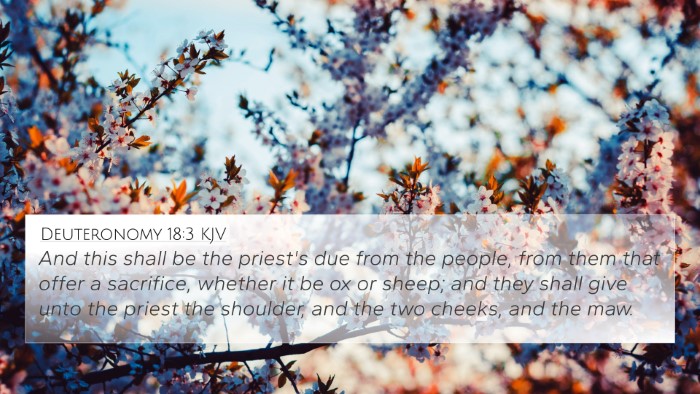Understanding Leviticus 7:32
Leviticus 7:32 states: "And the right shoulder shall ye give unto the priest for an heave offering of the sacrifices of your peace offerings." This verse elaborates on the ceremonial law of offerings, particularly concerning the distribution of sacrificial parts to the priests.
In the context of Leviticus, this verse emphasizes the importance of the priesthood and the sustenance provided to the priests through the offerings of the people. The shoulder being given as a heave offering signifies both the priest's role in the community and the recognition of their spiritual authority.
Commentary Insights
-
Matthew Henry: Henry highlights the significance of the shoulder as a symbol of strength and supports the idea that the priests are to be sustained from the people's offerings. He notes that this practice reinforces the covenant relationship between God, the priests, and the people.
-
Albert Barnes: Barnes discusses the practical implications of the heave offering. He views it as a means to ensure the livelihood of the Levites and underlines its role as a divine provision for ministry through ceremonial giving, showcasing God’s care for those serving in His temple.
-
Adam Clarke: Clarke provides a detailed interpretation of the offerings mentioned in Leviticus. He points out that the heave offering is a sign of consecration, and it demonstrates the people's gratefulness for the peace established with God through the sacrifice.
Bible Cross-References
To further explore the themes in Leviticus 7:32, we can look at various cross-references that relate to the priestly offerings and the sustenance of those in spiritual leadership:
- Exodus 29:27-28: Discusses the priestly garments and the portions of the sacrifices to be given to the priests.
- Numbers 18:8-10: Outlines the duties of the priests and their portions from the offerings.
- Deuteronomy 18:3-4: States the rights of the priests concerning the offerings made by the people.
- Leviticus 10:14: Reinforces the concept of priests receiving specific offerings as a portion of their service to God.
- 1 Corinthians 9:13-14: Paul discusses ministers living by the gospel, emphasizing the principle of support for spiritual leaders.
- Hebrews 7:5: Mentions the command given to the descendants of Levi to take tithes from the people of Israel.
- Matthew 10:10: Illustrates the concept that a worker is worthy of their food, linking the idea of support for those conducting ministry.
Thematic Connections
The connections across the scriptures highlight the importance of understanding the priest’s role and the broader theme of divine provision for those who serve in spiritual office. The following thematic connections can also be noted:
- Divine Provision: Each offering emphasizes how God provides for His servants and sustains the priestly function within the community.
- Covenantal Relationship: The offerings serve as a testament to the covenant between God and His people, reinforcing loyalty and reverence.
- Holiness and Consecration: The act of giving part of the sacrifice carries a tone of sanctity, representing the people’s commitment to God.
Tools for Biblical Cross-Referencing
For those interested in conducting deeper studies based on Biblical references, consider the following tools and methods:
- Bible Concordance: An essential tool for finding cross-references and thematic parallels in the scriptures.
- Bible Cross-Reference Guide: Look for resources which organize verses by themes for more efficient study.
- Cross-Referencing Bible Study: Engage in group studies that specifically focus on connecting different scriptural texts.
- Comprehensive Bible Cross-Reference Materials: Utilize comprehensive guides that offer extensive listings of cross-references between verses.
Conclusion
Leviticus 7:32 serves as a rich passage for understanding not only the ceremonial law regarding sacrifices but also the responsibility and provision for the priests. The insights from traditional commentaries combined with cross-referenced scriptures create a holistic view of the importance of these offerings in God’s covenant with Israel.
By exploring the connections between Bible verses and utilizing tools for Bible cross-referencing, deeper comprehension of scripture can be achieved, enriching personal faith and understanding of divine principles.










